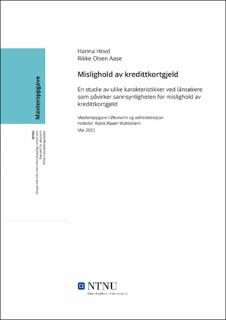| dc.contributor.advisor | Wahlstrøm, Ranik Raaen | |
| dc.contributor.author | Hovd, Hanna | |
| dc.contributor.author | Aase, Rikke Olsen | |
| dc.date.accessioned | 2022-09-20T17:23:30Z | |
| dc.date.available | 2022-09-20T17:23:30Z | |
| dc.date.issued | 2022 | |
| dc.identifier | no.ntnu:inspera:111624424:114435314 | |
| dc.identifier.uri | https://hdl.handle.net/11250/3019998 | |
| dc.description.abstract | Tema i denne masteroppgaven er mislighold av kredittkortgjeld. Formålet er å gi långivere av kredittkortgjeld en indikasjon på hvilke variabler som er viktige å hensynta i vurderingsprosessen av lånsøkere. Problemstillingen som vil studeres i denne masteroppgaven er dermed som følger: «Hvilke karakteristikker ved lånsøkere påvirker sannsynligheten for mislighold av kredittkortgjeld?». For å besvare problemstillingen utvikler vi prediksjonsmodeller, for deretter å studere variabelviktigheten. Prediksjonsmodellene utvikles ved bruk av logistisk regresjon og Extreme Gradient Boosting, mens variabelviktigheten studeres med henholdsvis Least Absolute Shrinkage and Selection Operator og SHapley Additive exPlanations.
Videre vil vi undersøke hvilken av de to estimeringsteknikkene som oppnår best prediksjonsevne ved utvikling av modeller for kredittvurdering. Da Extreme Gradient Boosting er en svart boks, vil vi også se på hvordan slike estimeringsteknikker kan gjøres tolkbare for begrunnelse av kredittvurderinger.
Studien er avgrenset til å evaluere innvilgede kredittkortsøknader i det norske privatmarkedet. Datasettet vi benytter er levert av Sparebank 1 Kreditt, og innholder data fra perioden november 2019 til desember 2021.
Vår studie konkluderer med at en lånsøker sin alder og årlige nettoinntekt er sentrale for prediksjon av mislighold av kredittkortgjeld. Videre finner vi også at informasjon om hvorvidt en kredittkortsøknad er sendt inn på natten, inngående beløp på debetkonto hos dataleverandør de siste 6 månedene, samt forholdet mellom søkt og innvilget kredittkortgrense er viktige variabler i kredittvurderingsmodeller. Dette er et unikt bidrag til litteraturen, da variablene tidligere ikke er nevnt i litteraturen innen kredittvurdering. Videre konkluderer oppgaven med at prediksjonsmodeller utviklet ved bruk av logistisk regresjon presterer noe bedre enn modeller estimert med Extreme Gradient Boosting. I tillegg finner vi at SHapley Additive exPlanations er godt egnet for å tolke svarte bokser. | |
| dc.description.abstract | The theme of this master's thesis is credit card default. The aim of this thesis is to give lenders an indication of which variables are important in the process of evaluating credit card applicants. In extension of this, we will look at the following question: “What characteristics of loan applicants affect the probability of default on credit card debt?”. This will be examined by developing credit scoring models, and then by studying the variable importance. The credit scoring models are developed using logistic regression and Extreme Gradient Boosting, while the variable importance is examined with Least Absolute Shrinkage and Selection Operator and SHapley Additive exPlanations, respectively.
Furthermore, we will investigate which of the two estimation techniques achieves the best predictive accuracy when developing models for credit scoring. As Extreme Gradient Boosting is a black box, we will also look at how such estimation techniques can be made interpretable to justify credit ratings.
This study is limited to evaluate approved credit card applications in the Norwegian private market. The data set is provided by Sparebank 1 Kreditt, and includes data from the period November 2019 to December 2021.
Our study concludes that a credit card applicant's age and annual net income are key variables when predicting credit card default. Furthermore, we also find that whether a credit card application has been submitted at night, the total incoming amount on the applicant's debit account maintained by the provider of data in the last 6 months, and the relation between applied and granted credit card limit are important variables in credit scoring models. This is a unique contribution to the literature, as prior literature within credit scoring do not include these variables. Furthermore, the thesis concludes that credit scoring models developed using logistic regression perform somewhat better than models estimated with Extreme Gradient Boosting. In addition, we find that SHapley Additive exPlanations are well suited for interpreting black boxes. | |
| dc.language | nob | |
| dc.publisher | NTNU | |
| dc.title | Mislighold av kredittkortgjeld | |
| dc.type | Master thesis | |
